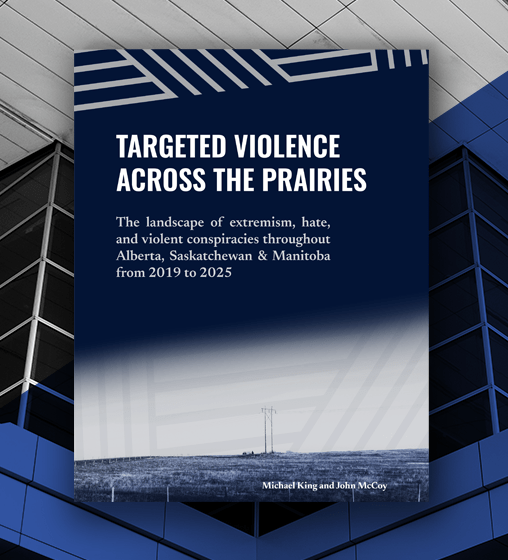OPV’s Senior Researcher Michèle St-Amant and Executive Director John McCoy examine the recent arrests near Quebec City and what they signal about the evolving threat of anti-government extremism in Canada.
Original Article
Published by The Montreal Gazette July 16, 2025
A land grab, a cache of stolen weapons, and a plot to form an anti-government militia. This isn’t a scene from an action movie: it’s what the RCMP uncovered in Canada.
On July 8, four men with ties to the Canadian Armed Forces, two of which were active members, were arrested in relation to an alleged plot to carry out an armed land seizure near Quebec City. Three face terrorism-related charges, and the fourth faces weapons and explosives charges.
Police say the men amassed an arsenal of weapons and explosives and planned to form an anti-government militia, describing it as a case of “ideologically motivated violent extremism.” The group’s activities included “shooting, ambush, survival and navigation exercises,” and a scouting operation. One suspect also launched an Instagram page to recruit others.
The case stands out not just for its violent aims and military ties, but because it reflects a growing global trend rooted in a belief that government is corrupt, illegitimate and harmful. Through research funded by the Canada Centre at Public Safety Canada, we at the Organization for the Prevention of Violence and Germany’s modus|zad found anti-government extremism in Canada and Germany is rising. Our findings align with the details of the Quebec arrests, suggesting incidents like this are not isolated.
Recent years have seen a wave of anti-government plots in democracies globally:
In France, a far-right conspiracist was charged with terrorism for planning a coup involving former soldiers and an attack on Élysée Palace.
In 2022, Germany arrested dozens connected to the Reichsbürger movement, including ex-military members and a former member of parliament, for plotting to kidnap the health minister, sabotage the power grid and spark a civil war.
In Belgium, police raids of anti-government “doomsday preppers” led to the death of a man who stockpiled over 100 weapons.
In the Netherlands, a sovereigntist movement member was arrested in 2024 for allegedly attempting to arm himself against the government.
And in the U.S., a trial is underway to decide the fate of a Pennsylvania man accused of decapitating his father for “treason” before attempting to initiate a coup.
These incidents share several characteristics: weapons stockpiling, paramilitary training and anti-government ideology, all of which appear to be present in the Quebec case.
While details of the plot are still emerging, our research helps situate it within this increasingly global trend:
First, weapons stockpiling and tactical training are consistent markers of anti-government extremism. Adherents often frame their world view around an imminent societal collapse, justifying their preparations. Others seek to directly confront the government.
Locally, in Canada, we saw similar dynamics in the 2020 Nova Scotia mass shooting — where the perpetrator had stockpiled weapons and expressed fears about societal collapse — and in the 2022 B.C. bank shooting, where twin brothers who held anti-government views had stockpiled weapons leading up to a staged bank robbery to lure and ambush police.
Second, the desire to seize land is not just a tactic, but an ideological goal. Many anti-government groups aim to seize land to form an alternative government or a sovereign community, or to establish an ethno-national enclave.
In Canada, we have seen modest attempts to create ideological settlements. Several years ago, it was reported that a German property developer in Nova Scotia, who recently pleaded guilty to firearms charges, attempted along with others to create a Reichsbürger colony in Cape Breton by selling property to like-minded Europeans seeking refuge from a prophesied European collapse.
Third, ties to the military are no coincidence. Anti-government groups often target current and former members of the military for recruitment, as highlighted in a 2020 Integrated Terrorism Assessment Centre report. Many extremist groups view them as high-value recruits, believing they possess the combat training to further the cause. Our research in Germany found similar trends, including several high-ranking Reichsbürger members with ties to the government or military.
The Quebec arrests should not be seen as an isolated incident, nor should they come as a surprise. Rather, they signal an evolution of anti-government extremism in Canada on par with global trends.
Canada has already seen isolated events like the storming of Rideau Hall by a former Canadian reservist in 2020 — and broader yet more fractured and less organized movements like the Canadian Freemen-on-the-Land. But the Quebec case appears far more networked, organized and, given the volume of seized weapons, further along in its plans for violence than previous efforts.
Anti-government extremism is rising globally, driven by conspiratorial thinking and a rejection of state legitimacy. Canada is not immune. Preventing future plots requires recognizing these events as part of a global pattern rather than isolated one-offs.
Michèle St-Amant is a senior researcher at the Organization for the Prevention of Violence where she researches far-right, anti-government and misogynist extremism.
John McCoy is the executive director and founder of the Organization for the Prevention of Violence. He is an adjunct professor at Ontario Tech University.
McCoy, John, and Michelle St-Amant. “Opinion: Quebec Extremist Plot a Warning – Not an Isolated Incident.” Montreal Gazette, 16 Jul. 2025. https://www.montrealgazette.com/opinion/op-eds/article1043507.html



